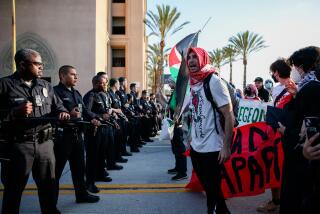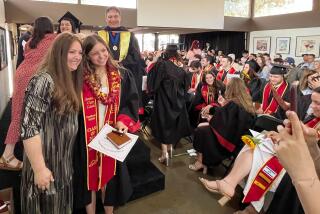Penn State takes it all very personally
- Share via
STATE COLLEGE, PA. — The area known as Paternoville sits at the corner of Curtin and Porter roads, in front of Gate A at Beaver Stadium.
On weeks leading up to Penn State’s home football games, tents are erected here by hundreds of students who sleep on concrete and withstand the cold to sit at the front of their designated seating section come Saturday.
Tim Rash spent this week at the makeshift tent city, named in honor of longtime football coach Joe Paterno.
Were this any other week, he and other campers would have been talking about the implications of their 12th-ranked team’s game against 19th-ranked Nebraska. Paterno might have even delivered them pizza, as he had so many times before.
But not this week. When Rash, a fourth-year mechanical engineering student, emerged from his tent at 5:30 Friday morning, his eyes were blinded by the bright lights of news vans.
“They were getting ready for the 6 o’clock news,” he said.
Paterno, after more than four decades on the job, is no longer the head coach. The focus is not on the game but on sex crimes against children allegedly committed by former defensive coordinator Jerry Sandusky.
Offensive schemes? Defensive formations? “No one’s been asking those questions,” Rash said. “Nobody’s asked about the game.”
A short distance away, an overflow crowd attended the first public gathering of the university’s full, 32-member board of trustees, which formed an investigative committee that will examine the actions of school officials who failed to stop Sandusky’s alleged activities.
Former athletic director Tim Curley and former university vice president Gary Schultz have been charged with perjury and failure to report an alleged 2002 assault by Sandusky that assistant coach Mike McQueary told a grand jury he witnessed.
McQueary told authorities that he reported what he saw to Paterno, who in turn told Curley. But police say they were not contacted and Sandusky was simply instructed not to bring children onto the campus.
Wednesday night, four days after the grand jury report became public and Sandusky was arrested, Paterno and university president Graham Spanier were fired. The revered coach’s dismissal quickly touched off a violent demonstration where a news van was overturned and rocks were thrown at police.
On Friday, McQueary was put on administrative leave, with acting university President Rodney Erickson saying the coach wouldn’t attend Saturday’s game because he had received threats.
Bad news seemed to come from everywhere. Moody’s Investors Service said it might downgrade the university’s credit rating in light of potential lawsuits and other “reputational and financial risk” the school was likely to endure. Those risks included “weaker student demand, declines in philanthropic support ... and significant management or governance changes,” Moody’s said in a news release.
Meantime, the university’s faculty senate called for students and employees to “act in ways that bring honor to our institution and ourselves.”
Some already were.
Students and fans who typically dress in all white for big games were encouraged to instead wear blue in support of child abuse victims. There was also a candlelight vigil attended by thousands late Friday on the lawn outside the university’s administration building, Old Main. Organizers said it was held to “show respect and support” for the children allegedly victimized.
John Balog, a fourth-year student, said he was upset by how Penn State students were portrayed as caring only about football. He said only a handful of students were responsible for Wednesday night’s violence and most “were just chanting.”
Larena Lettow, a 1998 graduate who now lives in New Jersey, was concerned enough about her alma mater’s image that she and her friends launched a website to raise money to support victims and survivors of sexual abuse. As of Friday night, proudpenstaters.com had raised close to $200,000.
Lettow said she and her friends were “rocked to our core.”
“We believed in the image of Penn State,” she said.
Lettow met her husband, Brian Rolli, in her final semester in school. Rolli works in finance. They have two children. “Penn State taught us to give back,” she said.
What was particularly maddening to her was how Sandusky allegedly used a charitable organization as a cover to abuse children.
Lettow was on her way to her old campus Friday. “I need to stand by my university,” she said. “They have defined a large part of who I am.”
Penn State is in the borough of State College, the proverbial middle of nowhere. Between State College and Harrisburg, home of the nearest major airport, most towns start and end within a couple of off-ramps on the two-lane highway. Outside of town are miles and miles of forest.
“To get there,” Lettow said, “you have to want to go there.”
With an enrollment of more than 40,000, Penn State’s University Park campus is one of the largest in the country, but students rarely leave the small college town except on holidays. Their college years are mostly spent within a few square miles. This, students and alumni say, creates a strong sense of community.
Paterno and the football program were a significant part of that community, so this week’s developments were taken personally.
Paterno embodied the school’s ideals, fielding winning teams while keeping high graduation rates and without breaking NCAA rules. He raised the school’s profile and donated millions of dollars to the institution. The campus library bears his name.
A few miles from campus, a priest at a Catholic Church where members of Paterno’s family worship predicted it would “take the people of State College a long time to recover.”
“It was a big part of who we were, whether we liked football or not, whether we liked his personality or not, whether we liked the university or not,” said the priest, who asked that his name not be used because of the situation’s volatility. “People are hurting. It’s left a hole in people’s hearts, not that they don’t empathize and sympathize with the victims. You have to live in this city to understand what Coach Paterno meant to this city.”
Making heroes out of those who triumph in a make-believe world, he said, is a mistake.
“Being a Catholic priest, I went through all this 10 years ago,” he added. “I know from experience, the only way to do this is to do what the board did. You have to send a message out. We can’t cover this up.
“We can’t simply follow the letter of the law. We have to protect children. The law is there, but you have to go beyond the law.”
Even the most ardent Penn State football boosters were being careful in how they showed support for the team.
Rich Mauti, who played for Paterno in the mid-1970s and has a son on this year’s team, sent emails to more than 800 former Nittany Lions asking them to stand on the sideline at Saturday’s game -- a show of solidarity, he said “for the [players] that have to go out there.”
“They went there to get an education and play football,” Mauti said. “They didn’t go there for this”
--
Times staff writers Mike Hiserman and Walter Hamilton contributed to this report from Los Angeles.
More to Read
Go beyond the scoreboard
Get the latest on L.A.'s teams in the daily Sports Report newsletter.
You may occasionally receive promotional content from the Los Angeles Times.










